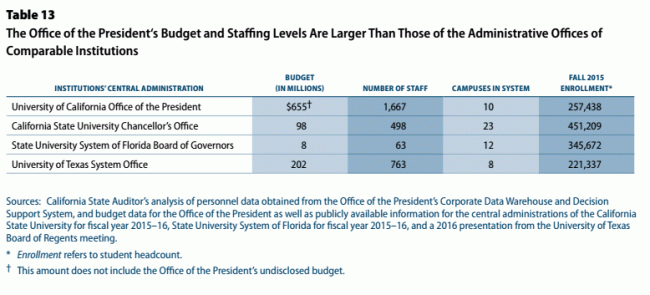An Honest Question to Progressives: When Does the Proportion of Tax Money Claimed By Government Workers Get Too Large?
I have sent the following question to a number of Progressives. I have yet to hear anything back.
I have been following the story about UC possibly hiding funds as a sort of rainy day fund in accounts because several years ago I worked with a lot of folks (e.g. Ruth Coleman) at California State Parks who lost their jobs when accused of the same thing. But looking at the story, the part that really appalled me was this from the auditor's report:
The last few years UC has been begging and pleading for $50 or $100 million extra so they could enroll more in-state students, when the office of the president, if this is presented correctly, seems to be bloated by perhaps $400 million. God knows what the administrative staffs of the individual universities look like.It appears what we have here is a conflict between more output of government services to the public, which I might call an ideological imperative of the Progressive left, with protection of government workers and their pay and benefits, which I might call a political imperative.
I am wondering if the Left's near absolute political support for government workers is undermining what I might call the good government impulses on the Left. My involvement with CA politics is mostly in parks, but I know that there are a number of fundamental reforms that could allow the parks agency to do a lot more with their current budget, in fact perhaps even start getting at working down deferred maintenance logs, but these were torpedoed as non-starters because they would involve job losses and changes in work rules. I am not saying they were discussed and defeated, I am saying they were stopped immediately as pointless to even discuss.
I don't agree with Progressives on the size and scope of government, but leave that aside. Taking the government's current size and tax base as a given, is there a segment of the progressive community that gets uncomfortable with the proportion of these resources that are channeled into government employee hands rather than into actual services for the public? Or is there a progressive argument for larger-than-needed government staff and higher-than-necessary pay and benefits (e.g. a city on the hill argument where the government is setting a higher standard that perhaps the benighted private employers will someday more closely emulate)?

